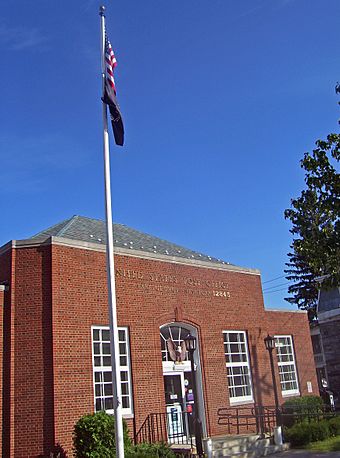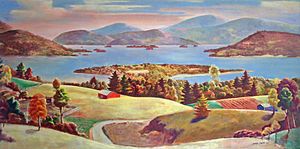United States Post Office (Lake George, New York) facts for kids
Quick facts for kids |
|
|
U.S. Post Office
|
|

West elevation, 2008
|
|
| Location | 180 Canada St., Lake George, New York |
|---|---|
| Built | 1940 |
| Architect | Louis Simon |
| Architectural style | Colonial Revival |
| MPS | U.S. Post Offices in New York State, 1858–1943, TR |
| NRHP reference No. | 88002338 |
| Added to NRHP | 1989 |
The U.S. Post Office in Lake George, New York, is an important building. It is located where Canada Street (US 9/NY 9N) meets Kurosaka Lane. This small brick building was built just before World War II. It helps people in the village of Lake George, the nearby town, and parts of Queensbury by handling their mail.
The building was designed by Louis A. Simon, an architect for the Treasury Department. He used a style called Colonial Revival, which looks like old American buildings. It also has some newer, modern touches. Later, a beautiful painting (called a mural) showing the Lake George area was added inside. In 1989, this post office was added to the National Register of Historic Places. It's the only post office in Warren County to get this special recognition!
What Does the Lake George Post Office Look Like?
The post office sits on a piece of land that gently slopes down towards the lake. It's on the northeast corner of an intersection. The area around it is mostly for businesses. There's a parking lot next to the post office, which you can get to from Kurosaka Lane. The building is set back from the street, with some plants and hedges in front.
It's a one-story building made with a steel frame and a strong concrete base. The outside is covered in brick. The front of the building has five sections, with the middle three sticking out a bit. This middle part has a hipped roof covered in slate, which means it slopes on all sides. The other roofs are flat. A narrow stone border runs around the top of the whole building. At the back, there's a part that sticks out with a loading dock for mail trucks.
The main entrance is in the middle of the front section. It has a rounded arch with brick around it and a special stone at the top. A metal eagle statue sits above the door. The words "UNITED STATES POST OFFICE" are written in bronze letters above the entrance. Below that, it says "LAKE GEORGE NEW YORK 12845" in smaller letters. Three granite steps lead up to the door. There's also a wheelchair ramp for easy access. Old iron railings and lanterns stand on either side of the entrance.
Inside, the lobby is shaped like an "L." The floor is made of terrazzo, which is a mix of stone chips and concrete. The lower part of the walls has beautiful marble, and above that, there's wood paneling with bulletin boards. The tables and counters inside are the original ones from when the building was new. A large painting by Judson Smith, showing scenes from Lake George, is on the wall above the entrance to the postmaster's office.
History of the Lake George Post Office
Lake George has had a post office since 1825. For many years, the post office rented space in different buildings. The village grew from being a trading center in the southeastern Adirondacks to a popular place for summer visitors.
In 1938, during the Great Depression, the government set aside money to build the current post office. This was part of a plan to help people find jobs. The land was bought, and construction started the next year. The new post office opened its doors in early 1941.
Louis Simon, the architect, used the Colonial Revival style. This style was common for post offices in smaller towns back then. You can see this style in the brick outside, the eagle decoration, and the way the windows are placed evenly. The way the central part of the building sticks out is also a classic Georgian design.
The building also has some features from the newer Moderne and Art Deco styles. These include the angled corners and large areas of brick above the windows. Only a few other post offices in New York, like those in Frankfort and Middleport, built around the same time, look very similar. The Westhampton Beach post office, built in 1940, also shares many features.
Judson Smith's mural was put up in 1942. Since then, not much has changed in the building. Some new fluorescent lights were added in the lobby in 1973, but the building still looks mostly the same as it did when it first opened.
 | Stephanie Wilson |
 | Charles Bolden |
 | Ronald McNair |
 | Frederick D. Gregory |




